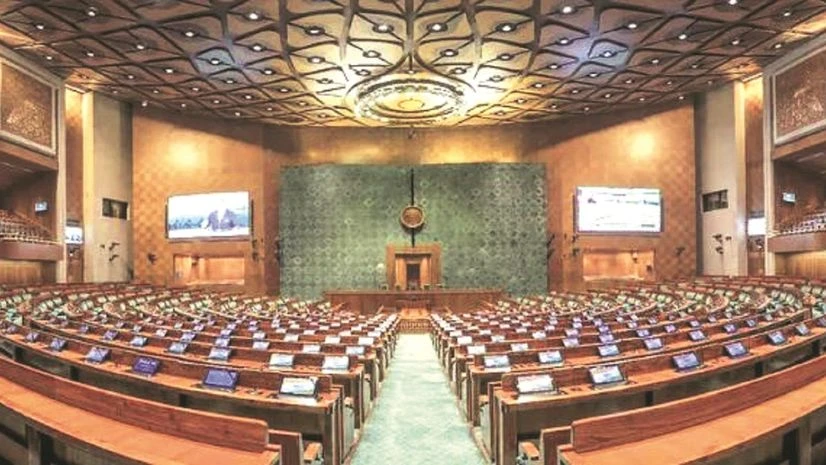In its link for Deputy Speaker, the Lok Sabha's official website states that "the position of Deputy Speaker has been vacant since May 2019".
The Opposition INDIA bloc, led by the Congress, is contesting the election to the Speaker's post since the ruling National Democratic Alliance (NDA) has not tried to build a consensus on the issue and announce that an Opposition member will be the Deputy Speaker.
In the history of independent India, the 17th Lok Sabha was the first that didn't have a Deputy Speaker, a post mandated under Article 93 of the Constitution. The Supreme Court also heard a petition demanding that the 17th Lok Sabha appoint a Deputy Speaker.
Article 93 states that the Lok Sabha shall choose two of its members as Speaker and Deputy Speaker. The President fixes the date of election of the Speaker, which is to take place on Wednesday. The election of Deputy Speaker is held on a date that the Speaker may fix, which has usually been held in the second session of a new Lok Sabha.
Until 1969, ruling party Congress held both posts, but that changed that year. It offered the post of Deputy Speaker to All Party Hill Leaders Conference's Gilbert G Swell, then an MP from Shillong. The tradition of offering the Deputy Speaker's post to either an alliance partner or the Opposition started then.
For the Congress in 1969, the decision came in the context of the split in the party with Speaker Neelam Sanjiva Reddy quitting the post to contest the election for the President of India. The Indira Gandhi-led Congress made the party's MP from Punjab Gurdial Singh Dhillon the Lok Sabha Speaker, while Congress' Raghunath Keshav Khadilkar, the Deputy Speaker under Reddy, made way for Swell, who remained the Deputy Speaker until 1977.
More From This Section
In 1977, the Janata Party government offered the post of Deputy Speaker to the Opposition Congress’s Godey Murahari, an MP from Andhra Pradesh.
In 1980, the Congress offered it to ally Dravida Munnetra Kazhagam (DMK), with its MP G Lakshmanan holding the post until the end of that Seventh Lok Sabha (1980-84). In the subsequent Lok Sabha, with the Rajiv Gandhi government in the saddle, Deputy Speaker's post went to M Thambi Durai of the AIADMK.
During the ninth Lok Sabha, which saw the Janata Dal-led National Front government at the Centre, Congress's Shivraj Patil was Deputy Speaker, with Janata Dal's Rabi Ray as the Speaker. In the subsequent Lok Sabha, Patil was Speaker, and the PV Narasimha Rao-led Congress government offered the Deputy Speaker's post to BJP MP from Karnataka S Mallikarjunaiah. During the United Front government (1996-98), BJP's Suraj Bhan was Deputy Speaker with PA Sangma, until then with Congress, was Speaker.
During the Atal Bihari Vajpayee government, which spanned two Lok Sabhas — 1998-99 and 1999-2004 — Congress's PM Sayeed was Deputy Speaker. In the UPA government years, Shiromani Akali Dal (SAD)'s Charanjit Singh Atwal (2004-09) and BJP's Kariya Munda (2009-14) were Deputy Speakers. The SAD was an ally of the BJP. In the first term of the Narendra Modi government, AIADMK's Thambi Durai was Deputy Speaker.
According to Article 95, the Deputy Speaker performs the duties of Speaker when that office is vacant or when the latter is away. If the office of Deputy Speaker is vacant, the duties are performed by a Lok Sabha MP whom the President appoints.
Article 94 says, if the Speaker intends to resign, s/he needs to address his/her resignation letter to the Deputy Speaker. The issue was debated in the Constituent Assembly. In 1949, HV Kamath argued that the Speaker should submit the resignation to the President and not the Deputy Speaker since the Deputy Speaker holds an office subordinate to the Speaker’s. Dr BR Ambedkar disagreed and argued that a person tenders his resignation to someone who has appointed him. He said the Speaker and Deputy Speaker are appointed or chosen, or elected by the House. Consequently, these two people, if they want to resign, must tender their resignations to the House, which is the appointing authority. "Of course, the House being a collective body of people, a resignation could not be addressed to each member of the House separately. Consequently, the provision is made that the resignation should be addressed either to the Speaker or to the Deputy Speaker because it is they who represent the House," he said.
Neelam Sanjiva Reddy resigned as Speaker of the 4th Lok Sabha on July 19, 1969, and addressed his resignation letter to the Deputy Speaker. “The House is informed of the resignation of the Speaker by the Deputy Speaker, and if the office of the Deputy Speaker is vacant, by the Secretary-General, who receives the letter of resignation in that House. The resignation is notified in the Gazette and the Bulletin,” say the Rules for Presiding Officers of the Lok Sabha.

)
